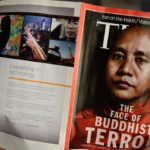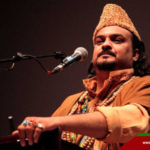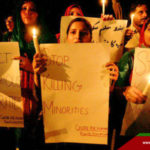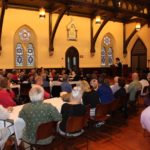By Víctor Solano Urrutia, Harvard University | Harvard · Harvard Divinity School
Four years ago, I was heading to the university on the same bus route as always. I sat in a chair and a man sat next to me. After some time, we started talking and he told me he was a Muslim. After exchanging some words, we began to talk about the fashionable topic of the time, which was Venezuela [1]. He had a very clear political position on the matter, but what impressed me the most was his conviction—he would never allow himself or his country to be oppressed. He manifested a sense of struggle and action that I had never heard of. At first, as the tranquil person that I am, it scared me a little, but as we talked, I realized the truth in his words and the sense of strength and resistance that he felt, even for a country that was not his own. I was impressed, but it was not until a couple of months ago that I started my professional practices and my classes on Islam that I managed to measure the transcendence of his words and the importance they had had for me even after so many years.
Inspired by this brother on the bus, and now having spent time studying Islam in classes and beyond, I have thought of these five ways Islam can permeate and inform our daily lives:
- Cultivate yourself. The history of Islam, from the viewpoint of one of the branches, the Shi’a, seems at first to be tragic and negative, as there is no golden past, they wish to return to. Likewise, most Prophets and Imams were persecuted and killed. It seems to be the story of Islam vs. Islam because the people who “believed” in the Prophets were the ones who killed them or their family in the end. However, this is also proof of the importance of cultivation. It is not enough to call yourself a Muslim and believe that it is a finished job. Reason and knowledge are unattainable, mutable, and temporary elements. Therefore, day by day we must show that we are cultivating ourselves so as not to make the same mistakes. Likewise, as a by-product of this, humility will emerge. One example of this is Imam Hussein, to whom the Muslims swore allegiance and company, however, on the Day of Ashura no more than 70 people were present by his side, and consequently, he was martyred. It is not enough to say that you are a Muslim, you have to prove it and cultivate a continuous ethical practice. If Muslims had done so, the imam would not have been killed and this is something everyone can do whether they are Muslims or practice another religion. The Qur’an says: “Indeed, they who have believed and done righteous deeds – those are the best of creatures.” (98:1)
- Guide yourself and guide others. True guidance is both spiritual and political and can happen on multiple levels. Whatever you believe in, you should make an effort to be a guide and seeker of freedom, but this concept transcends merely guiding people. Guidance is also guiding yourself, your family, and your relationships—if you know something, act on it. This is not exclusive to Shi’ism: “Ismah ibn ‘Isam reported: Imam Ahmad, may Allah have mercy on him, said, ‘Verily, I supplicate for the ruler to have right direction, guidance, and support, by night and day. I view that as an obligation upon me.’” (al-Sunnah li-Abī Bakr al-Khallal 1/83).
- Be vigilant over freedom. Those who remain silent in the face of oppression are just as guilty as the oppressor himself. For this reason, we must never stop fighting against injustice. Persisting and fighting against oppression, even when oppressed, is the only way to be free. But freedom includes freedom from ourselves and the ways we oppress our own souls. According to Islam we are born free, without sin; in our lives, we must fight against our corruption. One example of this is in a quote from the Qur’an that shows the result of piety and this internal struggle against oppression: “If anyone does evil or wrongs his own soul, but afterwards seeks God’s forgiveness, he will find Him most forgiving and merciful.” (4:110)
- Internalize knowledge then take action. Words are beautiful, they must be listened to, cared for, and taken into account, however, they simply fall short without actions. As can be read in the following hadith by Imam Sadiq (as): “Indeed, a small act based on the certainty that is performed continually, is better before God than abundant actions not based on certainty.” It is not enough to say that you believe in something or someone, you must take action and constantly cultivate yourself to correspond to what you believe in and what you say you believe.
- Pain matters. Just as darkness must exist for light to exist, we would never be grateful for health without the disease. This is the function of pain. In a society in which crying is usually repressed to avoid appearing weak, we forget its symbolic and therapeutic importance. Crying not only heals but also cleanses the heart. Purity of the heart is a necessary condition to act well and be a person of values. In the Ashura rituals, for example, we can see believers crying, from the youngest to the oldest. Crying is the vehicle to remember and remembering leads us to act and change society. Crying as a collective ritual allows us to remember that on the one hand there is oppression but on the other hand there is the promise of social justice.
As we could see, as a non-Muslim, I can say that applying these lessons that Islam brings us can significantly improve our lives. Becoming persistent, cultivated, pure-hearted people who take action and guide themselves and others is an everyday job, but applying it will not only make each one of us better but our community itself. I am grateful to that brother on the bus and to Islam for these lessons.
[1]According to the Interagency Group on Mixed Migratory Flows, Colombia has been the main destination country for Venezuelan migrants since 2014. The UN refugee agency attributes this fact to violence, threats, insecurity, lack of food, medicine, and essential services in Venezuela. According to DANE (National Administrative Department of Statistics of Colombia), as of February 2022, 2.2 million Venezuelans were living in Colombia, of which about 24% lived in Bogotá.








